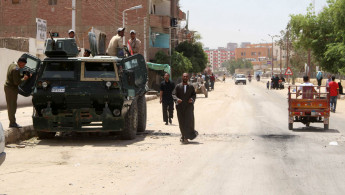Prominent Nubian activist dies after months in Egypt detention
A prominent Nubian activist detained in Egypt during a peaceful protest in September has died in jail in a case likely to fuel debate on conditions in the country's prisons.
Gamal Sorour, a businessman in his early fifties, died on Saturday having been detained in Aswan in together with at least 24 other Nubian activists, a lawyer and long-time friend said.
There were conflicting reports on whether he died in detention in Aswan or shortly after arriving at the hospital, but Sorour was said to suffer long-term health issues and underwent life-saving surgery several years ago.
Dozens of mourners attended Sorour's funeral Sunday in the central Cairo district of Abdeen, home to a large Nubian community.
Sorour was among 25 Nubians arrested in Aswan in early September for staging a peaceful protest by the Nile to demand the return of ancestral Nubian lands in the south of the country and greater respect for indigenous people's cultural rights.
The activists face accusations of taking part in an unauthorised demonstration, disrupting public order, and inciting protest and face five-year prison terms if convicted.
"After all he has done for his country, he has died while incarcerated with many others by authorities. Many honourable people died before him and many will do after, so long as our country is oppressed," long-time friend and fellow activist Haggag Oddoul wrote on his Facebook account.
"Sadly, Gamal Sorour is not the first or last detainee to die while in custody", Ragia Omran, a member of the state-sanctioned National Council for Human Rights wrote on Facebook.
"Medical negligence in police stations, prisons and detention centres is a daily occurrence, despite widespread campaigns calling for proper health care for detainees, which is a basic right."
Sorour also participated in the 2011 uprising against dictator Hosni Mubarak and was a philanthropist who generously gave to Nubians in need in both Cairo and southern Egypt.
Nubians complain they are subjected to discrimination by Egyptian state authorities because of their dark skin tones and indigenous language.
They say that authorities see them as a security threat and are mindful of any sign of secessionist sentiments among their ranks.
A constitution adopted in 2014 gives the government ten years to resettle the Nubians in dry parts of their ancestral lands, but they complain that no steps have yet been taken to achieve this goal.
Nubian communities were originally evicted from their ancestral lands in the 1960s to make way for a lake behind the High Dam on the Nile.
The evacuation of Nubians in the 1960s was the third in southern Egypt since the early 20th century. The other two were also because of dam construction on the Nile.
Allegations about the widespread use of torture in Egyptian jails have been frequent, from international bodies, human rights groups and former detainees.





 Follow the Middle East's top stories in English at The New Arab on Google News
Follow the Middle East's top stories in English at The New Arab on Google News
![The UAE is widely suspected of arming the RSF militia [Getty]](/sites/default/files/styles/image_330x185/public/2024-11/GettyImages-472529908.jpg?h=69f2b9d0&itok=Yauw3YTG)
![Netanyahu furiously denounced the ICC [Getty]](/sites/default/files/styles/image_330x185/public/2024-11/GettyImages-2169352575.jpg?h=199d8c1f&itok=-vRiruf5)
![Both Hamas and the Palestinian Authority welcomed the ICC arrest warrants [Getty]](/sites/default/files/styles/image_330x185/public/2024-11/GettyImages-2178351173.jpg?h=199d8c1f&itok=TV858iVg)